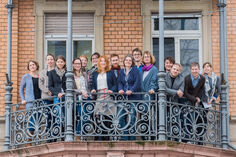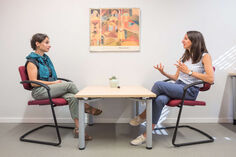Internet-based outpatient psychosocial aftercare after inpatient oncological rehabilitation: Process and outcome quality of an e-mental health module
Contact: PD Dr. Markus Moessner (markus.moessner(at)med.uni-heidelberg.de)
Project management: B. Watzke, H. Schulz, H. Kordy, K. Wegscheider
Project team members: J. Fink & B. Zimmer
Against the background of the optimization potential of the German health care system with regard to cross-sector integrated care, the aim of the project is to scientifically investigate the benefits of the Internet for the field of psychosocial aftercare following inpatient oncological rehabilitation. With the meanwhile large - and still increasing - spread of modern communication technologies, there are currently new possibilities to design a rehabilitative aftercare by using these technologies. In the development and implementation of new web-based care models, their effectiveness as well as promoting and inhibiting factors of utilization - also in the sense of a greater patient orientation - are to be investigated.
Within the framework of the project, an outpatient, location-independent and timely Internet service in the form of chat groups (eAftercare) was developed under the guidance of a psychotherapist for patients with breast cancer as well as for patients with prostate cancer and gastroenterological-oncological diseases and tested with regard to its feasibility, acceptance and effectiveness.
With reference to the approach of health services research, a prospective multi-time point survey (before and after inpatient rehabilitation, after e-follow-up and at 6-month follow-up) was realized. Patients receiving e-aftercare will be compared with patients receiving treatment as usual (i.e., no specific e-aftercare) in terms of their treatment outcome (quality of life/functional health, psychological well-being, and others). As a second focus of the study, potential inhibiting and facilitating factors of both implementation and uptake will be examined using a quantitative and qualitative approach. The results could hold valuable clues for future implementation strategies. The successful implementation of the project contents could thus serve as a guideline for further internet-based care services. Furthermore, the study can provide an empirical basis for potential transfer to other treatment settings and indication areas. In the first phase of the project, the requirements for the implementation of the e-aftercare service were developed (including manual development, setting up the Internet platform, therapist training). A pilot phase in one clinic was successfully completed, although the recruitment figures were significantly below the calculated case numbers. Therefore, additional clinics were recruited to participate. The implementation and utilization analyses described above were established as a second focus of study. The related assessments on this have been completed, and the data are currently being analyzed.
The main task of the FOST is the provision of the chat platform and the technical support of the chat groups. The focus of the scientific cooperation is process research by means of
Hauptaufgabe der FOST ist die Bereitstellung der Chatplattform und die technische Betreuung der Chatgruppen. The focus of the scientific cooperation lies on process research by means of computer-based interaction and text analyses.



